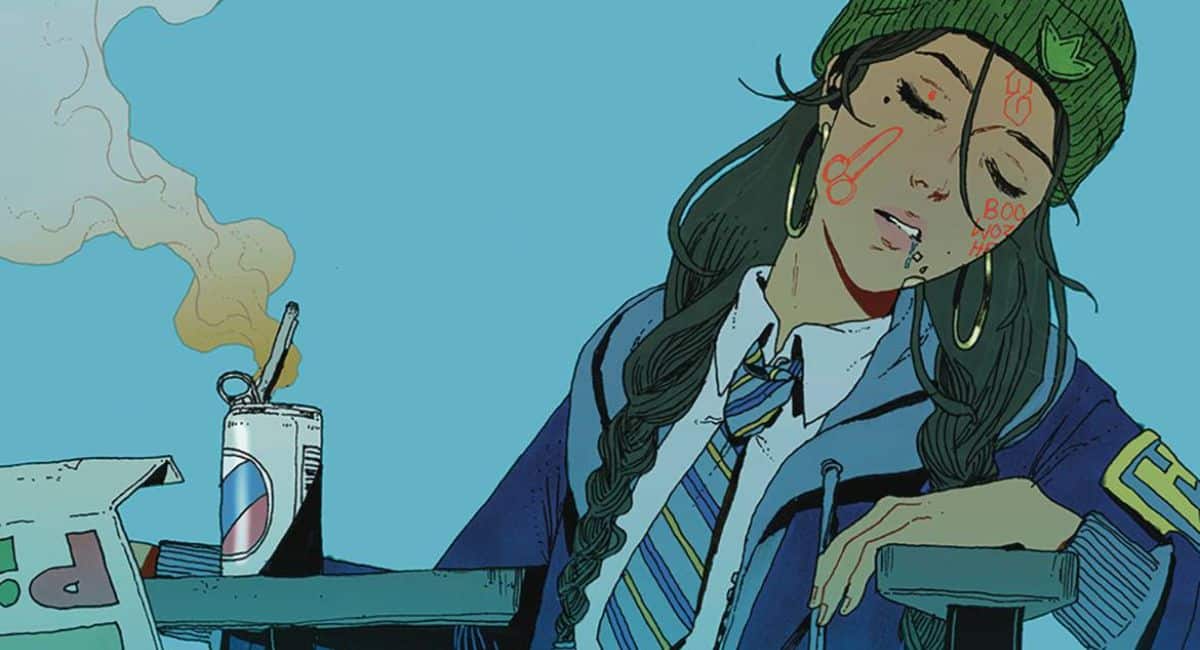Nestled in this account of author Neil Gaiman’s entry into the world of reading glasses is the news that he’s guest editing next year’s BEST AMERICAN COMICS, the Houghton Mifflin anthology.
Also realised very late last night that the problems I’ve had reading comics for the next Year’s Best American Comics that I’m guest editing has nothing to do with losing my love for comics and everything to do with the fact that somewhere in the last year I must have started needing reading glasses for small print and had not realised this. I found a pair of reading glasses and the world became one with good, easy-to-read comics in it once again… I suppose more things like this will happen as I age. How odd.
Previous editors include Anne Elizabeth Moore and Harvey Pekar, followed by Matt Madden and Jessica Abel with guest editors Chris Ware, Lynda Barry and Charles Burns. Gaiman certainly brings a different sensibility to the project, so let the hot stove league chatter begin now.




In 1969, Pat Oliphant won the Pulitzer Prize in Editorial Cartooning by studying previous winners and then crafting a cartoon which would appeal to the judges.
While I do not think the editors of BAC are that formulaic, I do see a trend of what appears in each volume. Too often, I find myself browsing through the book, looking at the pictures, and ignoring the text. When I read the comics, it feels like I’m at an indy comics show… It’s probably me… my sensibilities are more towards the mainstream. The selected artists and writers are probably good, and maybe they are doing interesting things with the medium, but it doesn’t appeal to me, and probably not to the general public. BAC could just use some diversity… (Other series in the “Best American” imprint seem to be accessible.)
I hope that Mr. Gaiman will use his connections (and clout if necessary) to encourage the larger publishers to participate. DC shot themselves in the foot while it was in their mouth with Batman 100.
Part of the problem is with serialized storytelling… how does one excerpt an issue and present it properly? Twenty-two pages is a good chunk of real estate (350-some pages), and it’s easier to use that space to present two or three shorter stories.
Maybe the larger publishers should revive their “Year’s Best” collections. Maybe someone could start a “Best American Comics for Kids” anthology.
BAC is appreciated, but I wish it could be better.
i’ll give it a flip, Gaiman’s a smart guy and i’m at least interested in what direction he might take. i’m only slightly worried that he’ll pick mainly comics that are similar to the kinds that he has written, but expecting to be proven wrong will be half the fun.
to the poster above, maybe you’ll luck out and my mildest fears will come true; and that’s okay too. i do almost feal guilty about how the series has for the most part been tailored to my tastes in comics, and maybe a slightly more story based approach to the next volume will get a new chunk of fans who might want to check out the previous editions.
i have no sense of ownership with this series, and it won’t bug me too much if i end up skipping a year’s because it has more Joss Wheidon than Fort Thunder.
I don’t think serialization’s a real problem with selection for this series — almost every comic in each volume is an excerpt, which is actually why I rarely pick it up. It’s a lot of literary loose ends for my taste! Kind of like reading a book called, “The Best American Novels” and only getting 10 pages of each novel.
Might this mean that the best-of could include something other than indy stuff? Gawd!
“indy” and “mainsteam” are meaningless words to the people who generally pick up these volumes.
the quality of the content is far more important than whatever labels our small part of the world assign them.
if this were the mid-80s, it would be 95% “mainstream” stuff and 5% strips and maybe something from Raw or Love & Rockets. the fact that the books have been consitantly focused on more “indy” stuff simply means that there are many good comics like that out right now. much more than from the “mainstream” counterparts.
20 years from now it might swing back in the other direction again, but complaining that the comics you happen to lean towards aren’t as good as they used to be usually means that you’re ignoring all the amazing things that have been happening in the art form over the last few years.
there’s nothing wrong with having a kind of genre/format loyality in your personal tastes, but quality is quality and these books tend to be jam packed with it.
Best of books, of any medium and genre, tend to be heavily curated. It’s really just easier to think of these things as a dip into the tastes of whoever’s the editor that year. At worst, the stuff picked is inoffensive if not necessarily everybody’s cup of tea. Do comic fans of any stripe pick up these things without having tried comics elsewhere? I figure these are mostly for casual or non-fans to pick up as gifts for the comic fans they know.
The only “mainstream” company issue that matters is that they be willing to participate, which I don’t think was the case with DC this year.
http://blog.newsarama.com/2008/06/30/missed-it-dc-keeps-batman-year-100-out-of-best-anthology/
Does this mean that McKean, Sienkiewicz and Vess will come out with new
comics work for 2010 (along others of that rich and varied SANDMAN stable)?
I’m in!
KNowing the kinds of work Mr. Gaiman does, I think this will be one of the most exciting years! I can’t wait to see what he chooses!